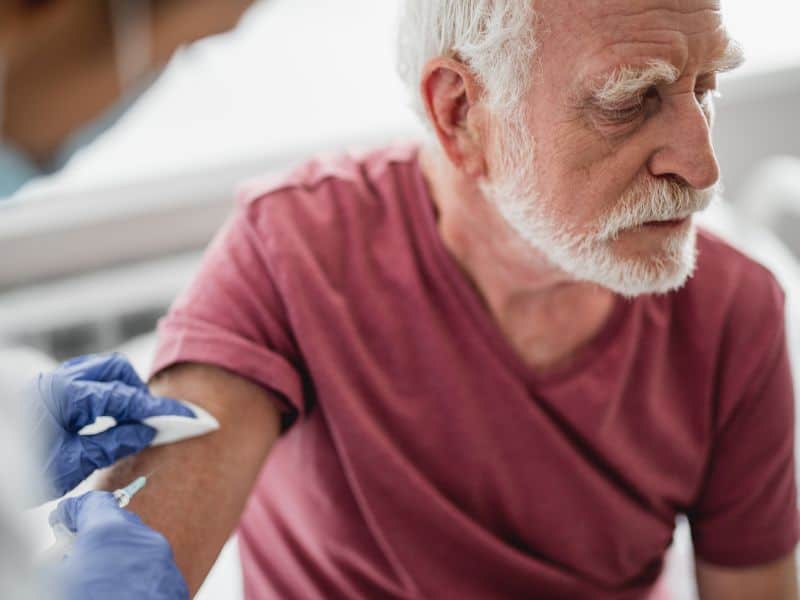
Johnson & Johnson’s single-shot Covid-19 vaccine candidate was shown to be very effective overall, but significantly less effective against the highly contagious South African B.1.351 variant of the disease predicted by many to become the dominant form of SARS-CoV-2 infection in the United States by mid-spring.
Data from the ENSEMBLE trial, released Friday morning, showed the vaccine to have a 72% overall efficacy in U.S., with a 66% overall effectiveness for preventing moderate-to-severe disease 28 days after vaccination.
Trial data from South Africa, where the B.1.351 variant was the predominant strain at the time of the study, showed the single-shot J&J-Janssen Pharmaceuticals vaccine to be 57% effective.
A day earlier, on Jan. 28, the biotechnology company Novavax, Inc. also announced new data from its protein-based Covid-19 vaccine candidate studies, with that vaccine showing an overall efficacy of close to 90% in phase III trials in the United Kingdom.
Efficacy declined to around 60% in HIV-negative South African participants, where almost all of the cases were caused by the variant strain. Overall efficacy in both HIV-positive and HIV-negative participants was around 50% (49.4%; 95% CI, 6.1-72.8).
Immunization Action Coalition (IAC) deputy director Kelly L. Moore, MD, MPH, called the Novavax findings encouraging in an email exchange with BreakingMED.
“Although the effectiveness in preventing illnesses caused by the variant in South Africa is lower than its effectiveness against other strains, the preliminary results of 60% effectiveness is still encouraging and worthwhile,” she said.
“We still have much to learn about the effectiveness of all of our Covid-19 vaccines against the emerging variants. It is quite possible that booster doses could be necessary to provide greater protection against future variants that escape the protection conferred by these first generation vaccines, and research is already underway to design booster vaccines targeting new strains of concern.”
The South African arm of the Novavax trial enrolled over 4,400 patients beginning in August 2020, with Covid-19 cases identified through mid-January of this year.
Twenty-nine Covid-19 cases occurred among the cohort during follow-up in the placebo group and 15 cases in the vaccine group, with just 1 severe case occurring in the placebo group and none in the vaccine group.
Early sequencing data available for 27 of the 44 Covid-19 cases showed the South African escape variant to be highly predominant (25 of 27 cases, 92.6%).
The trial results also suggested that prior infection with SARS-CoV-2 may not completely protect against the South African escape variant, given that a third of the enrolled patients were seropositive, demonstrating prior Covid-19 infection at baseline. These patients were not included in the primary analyses.
Epidemiologic investigation showed the pre-trial infections to be largely due to the original Covid-19 strain, while the infections occurring during the study were due to the variant virus.
The J&J-Janssen and the Novavax coronavirus vaccines are being developed with the backing of the U.S. government’s Operation Warp Speed program.
In July of last year, federal officials announced that Novavax would receive $1.6 billion from Operation Warp Speed to further develop it’s NVX-CoV2373 vaccine and deliver 100 million doses for use in the U.S. pending clinical trial data showing the vaccine to be safe and effective.
Federal officials have also ordered 100 million doses of the Jansen coronavirus vaccine contingent on acceptable clinical trial results.
Moore told BreakingMED that while it is not yet clear whether the South African SARS-CoV-2 strain will become dominant in the United States, it’s presence speaks to the urgency of vaccinating people quickly in the months to come.
“Although coronaviruses do not mutate at the pace of influenza viruses, the likelihood of new mutations emerging is driven higher by the incredible volume of new cases globally,” Moore said.
“The best way to slow down the development of new, more dangerous viruses is to slow down the pace of the pandemic by vaccinating people as swiftly as possible and by maintaining or strengthening the community mitigation measures we have been promoting for the past year.”
Epidemiologist John D. Grabenstein, RPh, PhD, who is also with the non-profit Immunization Action Coalition, agreed that vaccinating as many people as possible as quickly as possible is the best strategy for controlling Covid-19.
“The South African variant is going to do what it does, but we need to vaccinate as fast as we can to prevent the emergence of future variants,” he told BreakingMED. “If we take the basic bug out of the environment there will be far less opportunity for these variants to pop up.”
FDA emergency use authorization (EUA) approval of the J&J-Janssen and Novavax vaccines would ease the vaccine shortage and help expedite the roll out across the U.S. Hopes are especially high for the single shot J&J-Janssen vaccine, which can stay viable for months with normal refrigeration.
Johnson & Johnson has announced that it will file next week with the FDA. If emergency use authorization (EUA) status is granted the vaccine could be available for use in the U.S. by the end of February, Grabenstein said.
Novavax is still generating safety data in U.S. studies, and has announced an expected EAU filing by early March.
Grabenstein said even with the 2 additional vaccines, demand will still outpace supply.
“This is true for the U.S. and it is also true globally, but every evidence-backed vaccine we can get will be useful,” he said.
- Johnson & Johnson’s single-shot Covid-19 vaccine candidate was shown to be very effective overall, but significantly less effective against the highly contagious South African B.1.351 variant of the disease.
- On Thursday afternoon, the biotechnology company Novavax, Inc. also announced new data from its protein-based Covid-19 vaccine candidate studies, with that vaccine showing an overall efficacy of close to 90% in phase 3 trials in the United Kingdom, with efficacy declining to around 60% in HIV-negative South African participants.
Salynn Boyles, Contributing Writer, BreakingMED™
Cat ID: 926
Topic ID: 79,926,930,933,926,927,928,934


